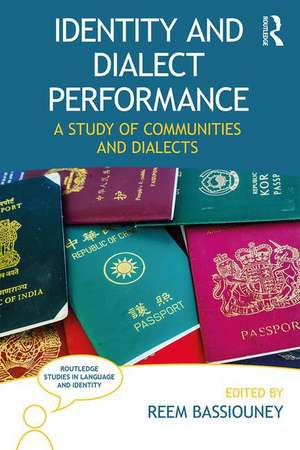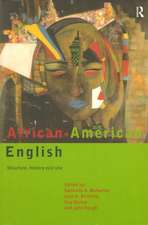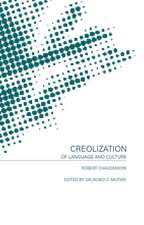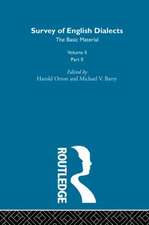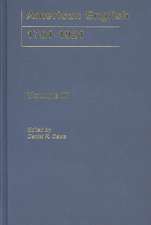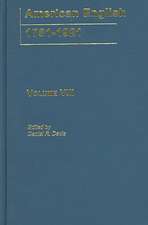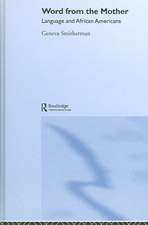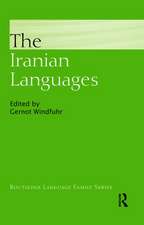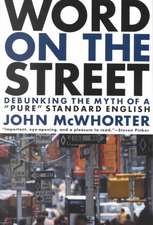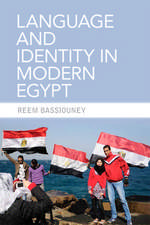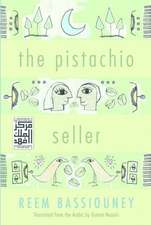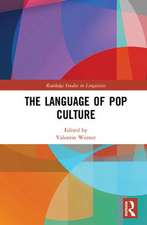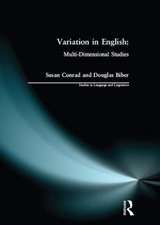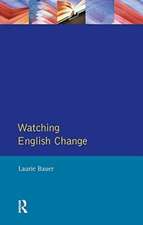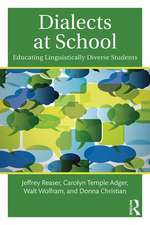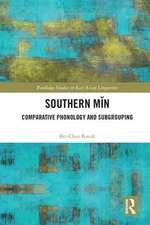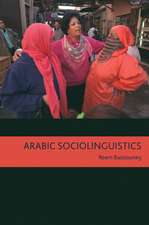Identity and Dialect Performance: A Study of Communities and Dialects: Routledge Studies in Language and Identity
Editat de Reem Bassiouneyen Limba Engleză Paperback – 8 noi 2017
The key outstanding feature of this particular book is that it spans an extensive range of communities and dialects; Italy, Hong Kong, Morocco, Egypt, Syria, Japan, Germany, The Sudan, The Netherlands, Nigeria, Spain, US, UK, French Guiana, Colombia,and Libya.
| Toate formatele și edițiile | Preț | Express |
|---|---|---|
| Paperback (1) | 376.06 lei 6-8 săpt. | |
| Taylor & Francis – 8 noi 2017 | 376.06 lei 6-8 săpt. | |
| Hardback (1) | 1335.69 lei 6-8 săpt. | |
| Taylor & Francis – 24 oct 2017 | 1335.69 lei 6-8 săpt. |
Preț: 376.06 lei
Nou
Puncte Express: 564
Preț estimativ în valută:
71.97€ • 74.50$ • 60.83£
71.97€ • 74.50$ • 60.83£
Carte tipărită la comandă
Livrare economică 05-19 martie
Preluare comenzi: 021 569.72.76
Specificații
ISBN-13: 9781138241787
ISBN-10: 1138241784
Pagini: 388
Dimensiuni: 156 x 234 x 28 mm
Greutate: 0.6 kg
Ediția:1
Editura: Taylor & Francis
Colecția Routledge
Seria Routledge Studies in Language and Identity
Locul publicării:Oxford, United Kingdom
ISBN-10: 1138241784
Pagini: 388
Dimensiuni: 156 x 234 x 28 mm
Greutate: 0.6 kg
Ediția:1
Editura: Taylor & Francis
Colecția Routledge
Seria Routledge Studies in Language and Identity
Locul publicării:Oxford, United Kingdom
Cuprins
Contents
List of Figures
List of Tables
List of Contributors
Introduction
I. Dialects in Localised Delocalised Contexts
1. Nonstandard dialect and identity
John Edwards(St. Francis Xavier University)
2. The elusive dialect border
Dick Smakman & Marten van der Meulen(Universiteit Leiden)
3. Dialect performances in super diverse communities: the case for ethnographic approaches to language variation
Anna De Fina(Georgetown University)
II. Nation-States and Identity Construction in Relation to a Standard and a Dialect
4. The construction of linguistic borders and the rise of national identity in South Sudan: some insights into Juba Arabic (árabi júba)
Stefano Manfredi(Centre national de la recherche scientifique, SeDyL-CELIA)
5. From language to dialect and back: the case of Piedmontese
Mauro Tosco(Università degli Studi di Torino)
6. Darija and the construction of "Moroccanness"
Dominique Caubet(INALCO, Paris, and Centre Jacques Berque, CNRS – MAE, Rabat)
7. ‘Sloppy speech is like sloppy dress’: folk attitudes towards non-standard British English
Carmen Ebner(Universiteit Leiden)
III. Contact, Variation, Performance and Metalinguistic Discourse
8. From varieties in contact to the selection of linguistic features in multilingual settings
Isabelle Leglise& Santiago Sanchez Moreano (Centre national de la recherche scientifique, SeDyL-CELIA)
9. ‘You live in the United States, you speak English’, decían las maestras: how New Mexican Spanish speakers enact, ascribe and reject ethnic identities
Katherine O’Donnell Christoffersen & Naomi Shin(University of New Mexico)
10. The social meanings of Wolof and French: contact dialects, language ideology, and competing modernities in Senegal
Fiona Mc Laughlin
11. The social value of variation in Tétouan and Ghomara (Northwestern Morocco)
Angeles Vicente & Amina Naciri-Azzouz(Universidad de Zaragoza)
12. New presentations of self in everyday life: Linguistic transgressions in England, Germany and Japan
Patrick Heinrich(Università Ca' Foscari)
13. Language and identity in Siwa Oasis: Indexing belonging, localness and authenticity in a small minority community
Valentina Serreli
IV. The Media, Dialect Performance and Language Variation
14. Youtube Yinzers: Stancetaking and the performance of Pittsburghese
Scott F. Kielsing (University of Pittsburgh)
15. Performing Scottish identity on Screen: Language, Identity, and Humour in Scottish Television Comedy
Natalie Braber (Nottingham Trent University)
16. Identity, Repertoire, and Performance: The Case of an Egyptian Poet
Reem Bassiouney(The American University in Cairo)
17. Ruination and amusement – dialect, youth and revolution in Naija
Anne Storch(Universität zu Köln)
18. Dialectal variation and identity in post-revolutionary Libyan media: The case of Dragunov (2014)
Luca D’Anna (University of Mississippi)
19. The effect of TV and internal versus external contact on variation in Syrian rural child language
Rania Habib(Syracuse University)
Index
List of Figures
List of Tables
List of Contributors
Introduction
I. Dialects in Localised Delocalised Contexts
1. Nonstandard dialect and identity
John Edwards(St. Francis Xavier University)
2. The elusive dialect border
Dick Smakman & Marten van der Meulen(Universiteit Leiden)
3. Dialect performances in super diverse communities: the case for ethnographic approaches to language variation
Anna De Fina(Georgetown University)
II. Nation-States and Identity Construction in Relation to a Standard and a Dialect
4. The construction of linguistic borders and the rise of national identity in South Sudan: some insights into Juba Arabic (árabi júba)
Stefano Manfredi(Centre national de la recherche scientifique, SeDyL-CELIA)
5. From language to dialect and back: the case of Piedmontese
Mauro Tosco(Università degli Studi di Torino)
6. Darija and the construction of "Moroccanness"
Dominique Caubet(INALCO, Paris, and Centre Jacques Berque, CNRS – MAE, Rabat)
7. ‘Sloppy speech is like sloppy dress’: folk attitudes towards non-standard British English
Carmen Ebner(Universiteit Leiden)
III. Contact, Variation, Performance and Metalinguistic Discourse
8. From varieties in contact to the selection of linguistic features in multilingual settings
Isabelle Leglise& Santiago Sanchez Moreano (Centre national de la recherche scientifique, SeDyL-CELIA)
9. ‘You live in the United States, you speak English’, decían las maestras: how New Mexican Spanish speakers enact, ascribe and reject ethnic identities
Katherine O’Donnell Christoffersen & Naomi Shin(University of New Mexico)
10. The social meanings of Wolof and French: contact dialects, language ideology, and competing modernities in Senegal
Fiona Mc Laughlin
11. The social value of variation in Tétouan and Ghomara (Northwestern Morocco)
Angeles Vicente & Amina Naciri-Azzouz(Universidad de Zaragoza)
12. New presentations of self in everyday life: Linguistic transgressions in England, Germany and Japan
Patrick Heinrich(Università Ca' Foscari)
13. Language and identity in Siwa Oasis: Indexing belonging, localness and authenticity in a small minority community
Valentina Serreli
IV. The Media, Dialect Performance and Language Variation
14. Youtube Yinzers: Stancetaking and the performance of Pittsburghese
Scott F. Kielsing (University of Pittsburgh)
15. Performing Scottish identity on Screen: Language, Identity, and Humour in Scottish Television Comedy
Natalie Braber (Nottingham Trent University)
16. Identity, Repertoire, and Performance: The Case of an Egyptian Poet
Reem Bassiouney(The American University in Cairo)
17. Ruination and amusement – dialect, youth and revolution in Naija
Anne Storch(Universität zu Köln)
18. Dialectal variation and identity in post-revolutionary Libyan media: The case of Dragunov (2014)
Luca D’Anna (University of Mississippi)
19. The effect of TV and internal versus external contact on variation in Syrian rural child language
Rania Habib(Syracuse University)
Index
Notă biografică
Reem Bassiouney is Professor of Linguistics at The American University of Cairo. Her recent book publications include Functions of Code-Switching in Egypt (2006), Arabic Sociolinguistics (2008), Arabic and the Media (2010, editor), Arabic language and Linguistics (2012, co-editor), Language and Identity in Modern Egypt (2014), and The Routledge Handbook of Arabic Linguistics (forthcoming, co-editor).
Recenzii
"This far-reaching book offers a range of global perspectives on dialect and identity. At the heart of Identity and Dialect Performance: A Study of Communities and Dialects is a contemporary understanding of dialect as an intentional performance of identity. This postmodern perspective throws many conventional assumptions and "truths" around dialect and identity into question and places the discussion of dialect at the intersections of class, race, ethnicity, geography, gender, and religious belief within a globalized, mediatized, and networked world. […] Overall, this excellent and fascinating book draws on a wide range of sources to give the reader a breadth of knowledge in relation to current social-linguistics and dialectology. [...] These contemporary studies have the potential to influence the approach to teaching dialect to actors in a way that suits the contemporary pluralist setting."
– Daron Oram, Senior Lecturer in Voice at the Royal Central School of Speech and Drama, University of London, UK
"Identity and Dialect Performance affords an original vantage point from which the nuanced intersectionality and dynamism inherent in research on dialectology and sociolinguistics can be championed. The result is a compendium of studies on how dialect performance and linguistic choices are linked to identity construction through metalinguistic discourse in a comprehensive range of communities. This collection also celebrates methodological eclecticism through a wedding of qualitative and quantitative methods to yield maximum insights into manifestations of dialect performance and the process of identity construction."
- Samuel C. S. Tsang, Department of English, University of Oxford, UK
"An excellent book, it is indispensable for those researchers and students concerned with the role of dialect in the performance and negotiation of social meaning. Its publi-cation will surely prompt further equivalent research in other contexts."
- Robert M. McKenzie, Department of Humanities, Northumbria University, UK, Journal of Multilingual and Multicultural Development
– Daron Oram, Senior Lecturer in Voice at the Royal Central School of Speech and Drama, University of London, UK
"Identity and Dialect Performance affords an original vantage point from which the nuanced intersectionality and dynamism inherent in research on dialectology and sociolinguistics can be championed. The result is a compendium of studies on how dialect performance and linguistic choices are linked to identity construction through metalinguistic discourse in a comprehensive range of communities. This collection also celebrates methodological eclecticism through a wedding of qualitative and quantitative methods to yield maximum insights into manifestations of dialect performance and the process of identity construction."
- Samuel C. S. Tsang, Department of English, University of Oxford, UK
"An excellent book, it is indispensable for those researchers and students concerned with the role of dialect in the performance and negotiation of social meaning. Its publi-cation will surely prompt further equivalent research in other contexts."
- Robert M. McKenzie, Department of Humanities, Northumbria University, UK, Journal of Multilingual and Multicultural Development
Descriere
This book discusses the relation between identity and dialects.
